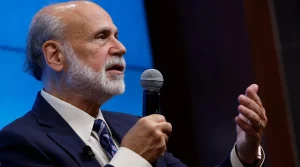
By Ron Kampeas
Ben Bernanke, the Jewish former chairman of the Federal Reserve, shared the Nobel Prize for Economics with two other scholars for their work in examining how banks function in economic crises.
Bernanke was recognized for an influential 1983 paper, written when he was a professor at Stanford University, that examined the Depression era to show how runs on banks during economic uncertainty tend to exacerbate and broaden a crisis. His theories helped inform his handling of the 2008 economic crisis and the bailout of major financial institutions at the time.
Sharing the prize for their separate research into bank collapse were two American scholars, Douglas Diamond and Philip Dybvig.
Bernanke, 68, was chairman of the Fed from 2006 to 2014, and was one of at least five Jewish chairmen of the body, which is the United States’ central banking system. His predecessor, Alan Greenspan, was Jewish, as was his successor, Janet Yellen.
The Associated Press quoted Bernanke as saying that he and his wife turned off their cell phones on Sunday evening, and so did not know about winning the prize until Monday when their daughter called and relayed the news. The Nobel academies generally inform laureates the evening before the official announcement. It’s not clear why the Bernankes had shut off their phones, but Bernanke, whose middle name is Shalom, is known to observe Jewish holidays, and Sunday was the first night of Sukkot.
Bernanke grew up in Dillon, South Carolina (where a highway interchange is named for him), and in his autobiography wrote how he encountered antisemitism growing up — classmates asked him if he had horns — but that saw that Blacks had it much harder. His family was among the few Jewish families in town and hosted rabbinical students who traveled from New York City to lead services.



